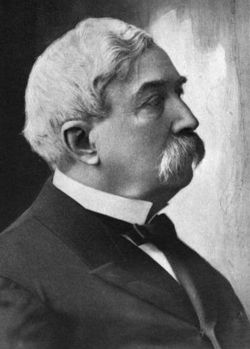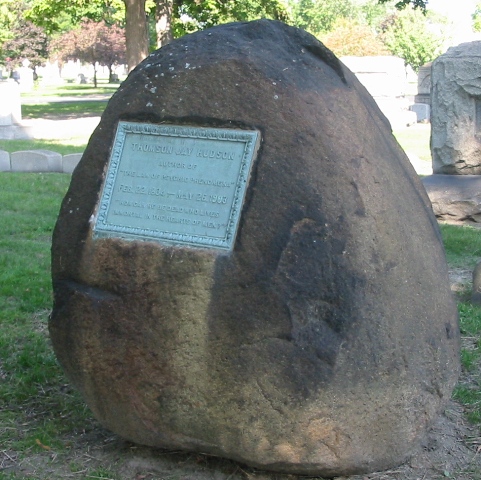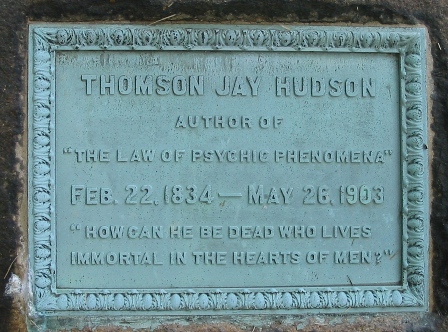Author. He gained fame as the pioneer authority in the field of metaphysics and was the author of the 1893 book, "The Law of Psychic Phenomena," which became a long-time best seller. Although formally educated in law, Thomson J. Hudson was a pioneer in such fields as psychology, philosophy, biology, metaphysics, and some areas of chemistry and physics. Critics considered his ideologies as very non-traditional. His primary field of study is psychic manifestations of the human intellect, exploring all areas of the metaphysical world from early philosophies to hypnotism and mesmerism, clairvoyance, visions and an overview of the psycho-therapeutic practices of the time. Hudson made serious inquiry into the nature of man, man's evolution, man's relationship with all nature and the actual working of man's mind. While preparing for college, Hudson's father insisted that he study for the ministry, which he stubbornly refused, leaving his home to pursue the study of law. By 1857, he had earned a Ph.D. from Ewing College and a law degree from St. John's College. At age twenty-three, he was admitted to the bar and practiced as an attorney and journalist in Port Huron, Michigan, until 1866. That same year, he entered politics to run as an unsuccessful candidate for the U.S. Senate. During a Canadian oil boom in the Lake Erie area shortly after 1860, Hudson spent considerable time in Canada researching and exploring the oil fields, and he developed a number of devices and processes for working in oil fields, which are still used today. He presumed a journalistic career, culminating in the editorship of the "Detroit Evening News," and in 1877, he became the Washington correspondent for the "Scripps Syndicate." He held this post until he was offered a position on the examining corps of the United States Patent Office in 1880. He remained with the Patent Office for thirteen years, rising to the position of Principal Examiner and in charge of one of the scientific divisions. He left the Patent Office in 1893 immediately after the publication of "The Law of Psychic Phenomena", which overnight made Hudson famous throughout the English-speaking world. His book proved to be one of the most successful of the last century, with over 47 printings. This famed surprised Hudson, for he had envisioned the text to be primarily of interest to scholars seeking a scientific approach to "right living and thinking." Besides his best seller, he wrote "Scientific Demonstration of the Future Life" in 1896, "Divine Pedigree of Man" in 1900, "Law of Mental Medicine" in 1903, and "Evolution of the Soul and Other Essays" in 1904. He spent the remainder of his life pursuing the study of the "true nature of man" with particular emphasis on the extra-sensory powers of man as manifested through psychic phenomena. According to his obituary, he died of angina pectoris and heart failure. He was married twice and was the father of five children. A copy of "The Law of Psychic Phenomena" is available on the United States Library of Congress' website.
Author. He gained fame as the pioneer authority in the field of metaphysics and was the author of the 1893 book, "The Law of Psychic Phenomena," which became a long-time best seller. Although formally educated in law, Thomson J. Hudson was a pioneer in such fields as psychology, philosophy, biology, metaphysics, and some areas of chemistry and physics. Critics considered his ideologies as very non-traditional. His primary field of study is psychic manifestations of the human intellect, exploring all areas of the metaphysical world from early philosophies to hypnotism and mesmerism, clairvoyance, visions and an overview of the psycho-therapeutic practices of the time. Hudson made serious inquiry into the nature of man, man's evolution, man's relationship with all nature and the actual working of man's mind. While preparing for college, Hudson's father insisted that he study for the ministry, which he stubbornly refused, leaving his home to pursue the study of law. By 1857, he had earned a Ph.D. from Ewing College and a law degree from St. John's College. At age twenty-three, he was admitted to the bar and practiced as an attorney and journalist in Port Huron, Michigan, until 1866. That same year, he entered politics to run as an unsuccessful candidate for the U.S. Senate. During a Canadian oil boom in the Lake Erie area shortly after 1860, Hudson spent considerable time in Canada researching and exploring the oil fields, and he developed a number of devices and processes for working in oil fields, which are still used today. He presumed a journalistic career, culminating in the editorship of the "Detroit Evening News," and in 1877, he became the Washington correspondent for the "Scripps Syndicate." He held this post until he was offered a position on the examining corps of the United States Patent Office in 1880. He remained with the Patent Office for thirteen years, rising to the position of Principal Examiner and in charge of one of the scientific divisions. He left the Patent Office in 1893 immediately after the publication of "The Law of Psychic Phenomena", which overnight made Hudson famous throughout the English-speaking world. His book proved to be one of the most successful of the last century, with over 47 printings. This famed surprised Hudson, for he had envisioned the text to be primarily of interest to scholars seeking a scientific approach to "right living and thinking." Besides his best seller, he wrote "Scientific Demonstration of the Future Life" in 1896, "Divine Pedigree of Man" in 1900, "Law of Mental Medicine" in 1903, and "Evolution of the Soul and Other Essays" in 1904. He spent the remainder of his life pursuing the study of the "true nature of man" with particular emphasis on the extra-sensory powers of man as manifested through psychic phenomena. According to his obituary, he died of angina pectoris and heart failure. He was married twice and was the father of five children. A copy of "The Law of Psychic Phenomena" is available on the United States Library of Congress' website.
Bio by: Mark Gade
Inscription
THOMSON JAY HUDSON
Author of "The Law of Psychic Phenomena"
"How can he be dead who lives immortal in the hearts of men?"
Gravesite Details
Huge boulder with bronze marker
Family Members
Advertisement
See more Hudson memorials in:
Explore more
Sponsored by Ancestry
Advertisement













